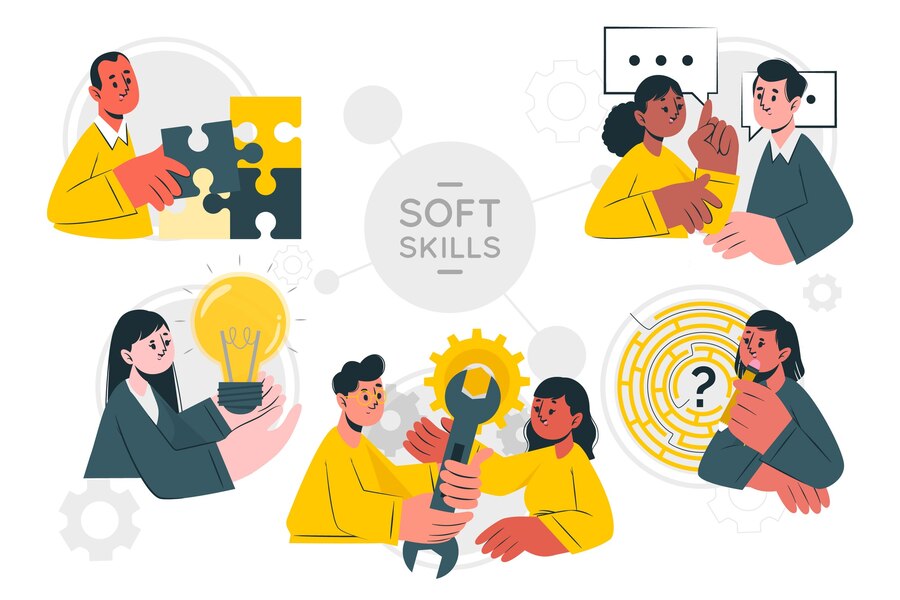Regardless of the role, companies want certain abilities from applicants, and possessing these abilities can increase your marketability to recruiters. Skills like collaboration, communication, and problem-solving are sought after by employers because they may be useful in accomplishing objectives and producing outcomes in a variety of sectors.
Here, we go over the top 7 skills that hiring managers look for in candidates, how to emphasize them, and advice on how to stand out from the competition.
Top 7 Skills Employers Look For

Employers can rapidly assess your qualifications by highlighting your most marketable talents on your cover letter and CV. Hiring supervisors will find you more appealing if your talents are applicable. The following are 7 employability abilities that hiring managers look for most in candidates:
1. Communication skills
Effective communication is a critical component of almost every profession. Employers are likely to want team members who can effectively interact with others and understand what is expected of them. Your CV should highlight your ability to communicate through writing, speaking, listening, and bargaining.
2. Interpersonal skills
You can communicate and collaborate effectively with people if you possess interpersonal skills. Interpersonal skills are vital since you may wind up dealing with supervisors and coworkers even if you are not in a position that requires you to interact directly with customers. Relationship building, efficient communication, and situational management are all made possible by these abilities. Employers frequently search for interpersonal abilities, including empathy, drive, and adaptability.
3. Organizational skills
Productivity, time management, and goal achievement are all improved by an employee’s organizational abilities. They are very desirable to employers and helpful in any professional role. Particularly crucial organizational abilities include dispute resolution, planning, critical thinking, and attention to detail.
4. Computer skills
In one way or another, computers are used in almost every profession. Including computer skills on your resume can help employers know that you are at least familiar with the fundamentals of computers, since many positions need a more in-depth understanding of computers. It’s a good idea to emphasize in your resume any more sophisticated computer abilities that are required for the position you’re going for. Proficiency with word processing software, spreadsheets, social networking, data visualization, and email communication is are example of computer skills to emphasize.
5. Open-mindedness
Anyone starting a new job has to have the ability to be open-minded. The new organization you work for could operate differently, even if you previously held the same role elsewhere. Being eager to learn and try new things, as well as having an open mind to learning a new approach to execute your tasks, may be a beneficial quality for job prospects.
6. Strong work ethic
Another great quality to emphasize while applying for employment is a strong work ethic. Companies want workers they can rely on to complete tasks and adhere to deadlines without requiring constant supervision. You can finish projects and handle your work without supervision if you have a strong work ethic.
7. Self-management skills
Self-management enables you to effectively manage your time and maximize your productivity at work. These abilities guarantee that you successfully prioritize your work, concentrate on your career development, and benefit your company overall. Time management, organization, and self-motivation are all excellent self-management abilities to highlight on your CV.
Highlighting the Skills for Employers

Interviews, cover letters, and resumes are some of the ways that employers check for a candidate’s talents. When showcasing your abilities in each of these contexts, bear the following points in mind:
1. Include appropriate skills on your resume
Your resume’s “Skills” section is the ideal area to showcase your finest abilities. Your talents can be included in bullet points, with a brief description or examples for each. The descriptions of your job responsibilities in the experience part of your resume might also include references to these abilities.
2. In cover letters, use narrative techniques
You can highlight two or three of your most marketable abilities in your cover letter, depending on how they connect to the position you are applying for. Think about including instances of your prior job experience where you have applied these talents in the body of your cover letter. Telling stories to prospective employers is a great way to highlight your abilities and personalize your job experiences.
3. Demonstrate your skills
Speaking candidly with the employer about your marketable qualities during a job interview is a terrific idea. You can give examples of how you have previously applied your expertise throughout the interview. Make an effort to include every talent that is pertinent to the role, particularly those that were highlighted in the job description.
Conclusion

In order to stand out in a competitive job market and show employers that you’re serious about the position, it’s also critical to have some relevant work experience along with all the above-mentioned skills.
Do you want to know how you can develop these skills, or looking for guidance? Then, feel free to avail EnrichMyCareer’s Career Counselling session.
Visit EnrichMyCareer for more information.
Frequently Asked Questions
1. Which skill is most in demand?
Skills pertaining to cybersecurity, data science and analytics, and artificial intelligence (AI) and machine learning (ML) are anticipated to be in great demand in 2025. Furthermore, software development, cloud computing, and digital marketing continue to be formidable competitors.
2. What are soft skills in a CV?
Communication, teamwork, flexibility, problem-solving, leadership, emotional intelligence, and time management are a few examples of soft skills. In the workplace, both hard and soft skills are crucial, and having a combination of both can improve a person’s chances of achieving professional success.
3. What does HR look for in a candidate?
HR will select a candidate who knows how to manage the business, monitor their work, and make sure all tasks are finished correctly. A productive worker is organized, diligent, and works on their own initiative rather than under supervision.

A content writer with a passion for crafting engaging content. Dedicated to continuous learning and innovative, excels at adapting diverse writing styles.



